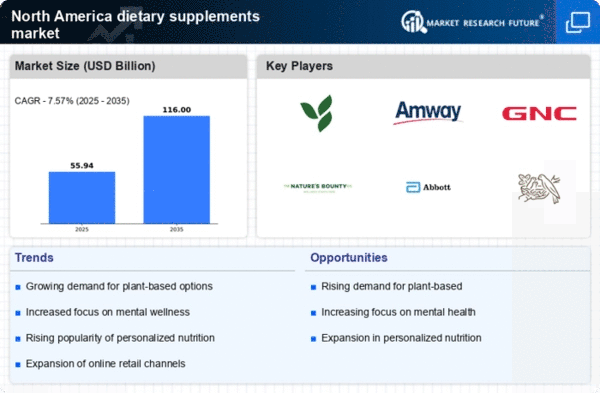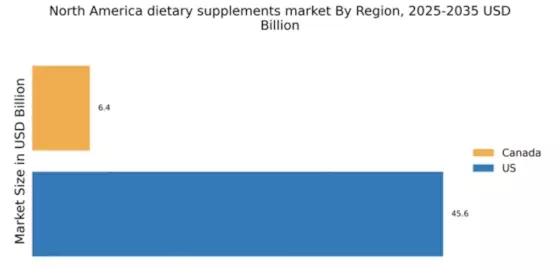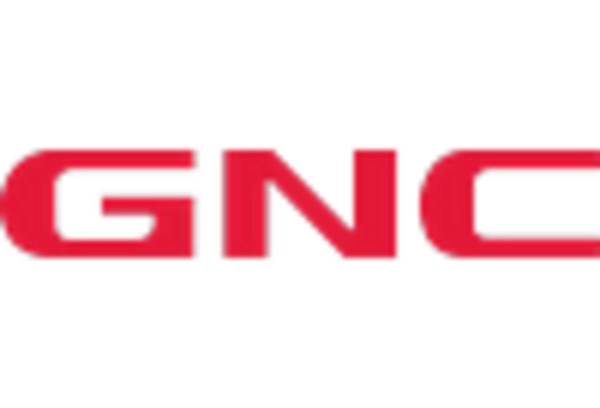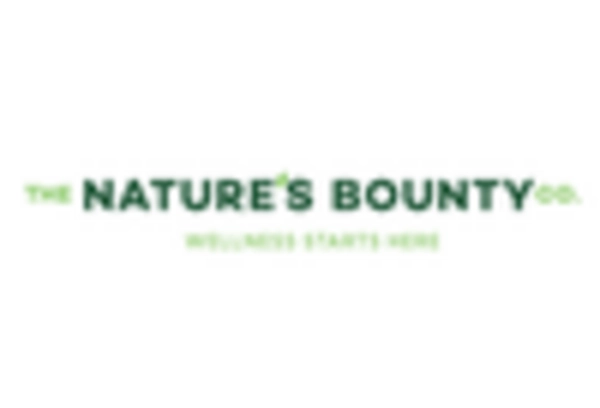Aging Population
The demographic shift towards an aging population in North America is significantly impacting the dietary supplements market. As the population ages, there is a corresponding increase in the prevalence of age-related health issues, prompting older adults to seek dietary supplements to support their health. It is estimated that by 2030, nearly 20% of the North American population will be over 65 years old. This demographic is particularly inclined towards supplements that promote joint health, cognitive function, and overall vitality. Consequently, the dietary supplements market is poised to expand as manufacturers develop products tailored to meet the specific needs of this growing segment.
E-commerce Growth
The rise of e-commerce is transforming the dietary supplements market in North America, providing consumers with unprecedented access to a wide range of products. Online sales of dietary supplements have surged, accounting for over 30% of total sales in the industry. This shift is largely attributed to the convenience of online shopping, coupled with the ability to easily compare products and read reviews. As consumers increasingly turn to digital platforms for their purchasing needs, the dietary supplements market is adapting by enhancing online presence and marketing strategies to capture this growing segment of tech-savvy consumers.
Regulatory Developments
Regulatory changes are significantly influencing the dietary supplements market in North America. The industry is subject to stringent regulations aimed at ensuring product safety and efficacy. Recent updates to regulations have prompted manufacturers to enhance transparency in labeling and ingredient sourcing. This shift is likely to foster consumer trust and confidence in dietary supplements. As the regulatory landscape evolves, the dietary supplements market must adapt to comply with new standards, which may also lead to increased innovation in product development to meet consumer demands for quality and safety.
Influence of Social Media
Social media platforms are playing a pivotal role in shaping consumer perceptions and behaviors within the dietary supplements market in North America. Influencers and health advocates are increasingly promoting various supplements, leading to heightened awareness and interest among followers. This trend appears to be particularly effective among younger demographics, who are more likely to trust recommendations from social media personalities. As a result, the dietary supplements market is witnessing a shift in marketing strategies, with brands investing in influencer partnerships to reach a broader audience and drive sales.
Increasing Health Consciousness
The dietary supplements market in North America is experiencing a notable surge in demand, driven by a growing awareness of health and wellness among consumers. Individuals are increasingly prioritizing their health, leading to a rise in the consumption of dietary supplements. According to recent data, approximately 70% of adults in North America report using dietary supplements regularly. This trend is likely to continue as consumers seek to enhance their overall well-being, boost immunity, and prevent chronic diseases. The dietary supplements market is thus benefiting from this heightened health consciousness, as more individuals turn to supplements as a proactive approach to health management.


















